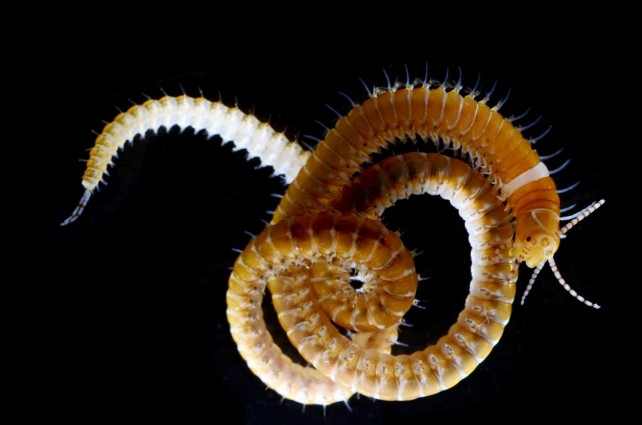
Smithsonian Deep Reef Observation Project (DROP) scientists spent six days exploring the diversity of marine life off northwest Dominica to depths of 300 m (1,000 ft.).
The scientific team comprised specialists of fishes, crabs and other crustaceans, sponges, corals, hydroids, mollusks, and algae. In six days of submersible diving, along with snorkeling or scuba diving on a few shallow sites, the team collected nearly 2,000 specimens of marine life for scientific study.
Among the collections are many apparently new species, lots of rare species, and numerous species not yet recorded from the eastern Caribbean. For most specimens, in addition to preserving the whole specimen for future scientific study, a small piece of the body was removed and preserved specifically for DNA analysis back in the Smithsonian’s Laboratory of Analytical Biology in Washington, DC. Detailed study of the preserved specimens and analysis of their DNA will help DROP biologists better understand exactly what species they collected.
Discovering new species is rarely a “eureka” phenomenon; rather, it takes careful study of physical and genetic aspects of specimens to determine if something is new. Results of the expedition will be published in numerous articles in scientific journals, as well as on various forms of social media.
Expedition Posse (2)Relative to the deep reefs (50 to 300 m or approximately 150 to 1,000 ft) off Curacao in the southern Caribbean, the DROP team found the deep reefs off NW Dominica to be more diverse in sponges, less diverse in fishes, crustaceans, and mollusks, and more heavily covered with silt from runoff from the many rivers on the island.
Among the discoveries on the trip were vertical, tube-shaped sponges covered with spikey projections that provide habitat for tiny fishes, crustaceans, corals, hydroids, echinoderms, and more. Identifying everything found just on these sponges alone will take DROP scientists many months! Another highlight was dipping up deep-sea fishes, squid, and crustaceans with hand nets – not from deep depths while submersible diving but at the surface at night while on the ship. Although the scientific crew was knowledgeable about the daily vertical migration patterns of mid-water fishes and crustaceans, they had never encountered such marine life coming up from the deep into shallow coastal waters where the R/V Chapman was anchored.
The greatest outcome of the expedition is data on a deep-reef ecosystem that has never been studied before. Tropical deep reefs are diverse ecosystems that have largely been overlooked by science – too deep to access using conventional scuba gear and too shallow to be of much interest to deep-diving submersibles.
DROP scientists can now compare what they found here in Dominica with collections made previously using the Curasub submersible off Curacao in the southern Caribbean and those made in the 1970’s and 1980’s by the Johnson Sea Link submersibles off Florida, the Bahamas, Barbados, and Cuba. Understanding the diversity of life on deep reefs and how it is related to life on shallow reefs is critical to knowing whether deep reefs may play a role in the survival of heavily impacted shallow Caribbean reefs.
During the expedition, scientists noticed that many species commonly found only on shallow reefs elsewhere in the Caribbean were also found much deeper in Dominica. Might shallow-reef species already be moving to deeper reefs in response to warming surface waters? Other questions remain as well. Is the diversity of marine life on deep reefs off Dominica truly lower than that in the eastern Caribbean, or might submersible diving off other parts of Dominica yield a different picture? How does the sediment from river runoff impact deep reefs over long periods of time? What are the migration patterns of deep-water species that result in their presence at night in shallow coastal waters? Such is science: new knowledge spawns new questions.
Photo from MV Chapman

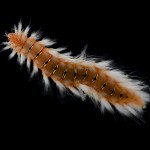
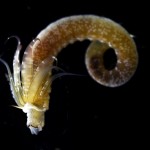


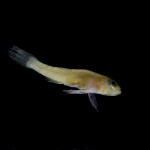
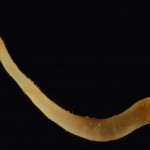
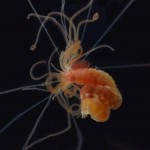
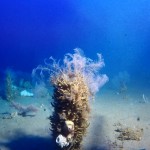
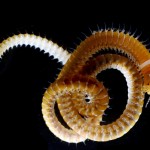
Disclaimer: The comments posted do not necessarily reflect the views of DominicaNewsOnline.com and its parent company or any individual staff member. All comments are posted subject to approval by DominicaNewsOnline.com. We never censor based on political or ideological points of view, but we do try to maintain a sensible balance between free speech and responsible moderating.
We will delete comments that:
See our full comment/user policy/agreement.